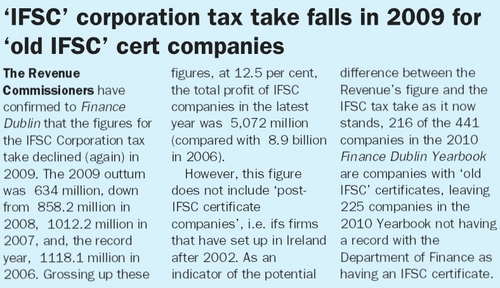In 2007 the number of jobs also fell but by a smaller amount of 152 jobs, giving a fall of 0.6 per cent. The total job losses for the IFSC during 2008 and 2009 has been 366, indicating the resilience of the sector in the face of the credit crisis.
Banking jobs fell to 9,716 from 10,316 in 2009. This is a loss of 608 jobs or a fall of 5.7 per cent. This fall reflects the international credit crisis which resulted in a number of rationalisations and casualties.
Padraig Rushe, director at Bank of Ireland Corporate Banking and chairman of the Banking and Treasury working group of the Department of Taoiseach’s Clearing House Group, says that the survey results ‘reaffirm the resilience of the IFSC despite difficulties encountered.’ He said that falls are largely down to a decrease in hiring as opposed to a great number of redundancies. Speaking specifically about the banking result Rushe said, ‘the banking industry is pretty much holding up’ and that as ‘markets pick up’ employment will grow. He also mentioned the emergence of new business streams and drew particular attention to the Green Financial Services where he said there is a feasibility study currently underway which indicates strong prospects for Ireland.
And should the Government maintain and improve Ireland’s tax competitiveness, the IFSC banking model is well placed to support a more stable international banking industry in the future, other sources believe. There was some disappointment recently when the Government failed to include a suggested cash pooling amendment in the Finance Bill as outlined in the February edition of Finance Dublin – a change which many said would have boosted treasury services in the IFSC.
Funds jobs fell to 10,560 from 10,651 in 2009. This is the first fall in funds jobs since the Finance Dublin Employment Survey began. However, again the fall is small - just 91 jobs, or 0.8 per cent. While there has been some falls in jobs in the larger fund servicing companies there are however pockets of growth, encouragingly, in a group of smaller entrepreneur-led firms. For instance, Quintillion, Abbey Capital, Apex, & Carne Global Financial Services all grew in 2009. In addition to this growth some of the bigger employers in funds have announced that they have already begun hiring in 2010. William Slattery chief executive of State Street Ireland announced at the opening of State Street’s new offices on March 1st that State Street have been on a recruiting drive since the start of 2010 with a total number of 2,300. Likewise speaking about employment Brian Ruane of BNY said in January about the acquisition of PNC GIS in Dublin that he sees the merger bringing their total jobs figure to ‘over 2,000’ making the combined entity one of the top twenty employers in the state.
Insurance is the brightest spot in the survey and indeed one of the best performers in the economy. Insurance jobs in Yearbook companies grew in 2009 to 4,011 from 3,526. There were 485 more people employed in insurance in 2009 an increase of 13.7 per cent. There were some IFSC casualties but mainly caused by problems in parent companies hit in the past two years. But the sector was buoyed by an significant increase in jobs in many firms, for example: AXIS Specialty Europe Limited, CACI Life Limited, St Andrew’s Group and in reinsurance: RGA International Reinsurance Company Limited and Mitsui Sumitomo Reinsurance Limited. Allied to this has been the investments in Ireland by Zurich Insurance PLC and Aviva to run business through their Irish operations.
Asked by Finance Dublin what his observations were on the rise in insurance Tim Hennessey of Axis and chairman of DIMA said, ‘The global re/insurance industry (with one exception) weathered the financial crisis very well and is a strong testament to risk management practices within the industry. Ireland has continued to benefit from corporate restructuring taking place within the industry and has seen new start ups and redomestication of existing businesses to Ireland.
‘Restructuring is taking place throughout Europe in the lead up to Solvency II implementation in 2012. Ireland remains an extremely attractive domicile for international re/insurers.’ Asked if he expected the trend to continue in 2010, Hennessey said, ‘Yes - I expect Ireland will continue to benefit from the restructuring taking place within the industry. A more competitive cost base including the tax environment coupled with the commitment of the Financial Regulator to upskilling all lead to a strong foundation for growing existing and new re/insurers from Ireland.’
Also the list of new entrants to the 2010 Finance Dublin Yearbook is flush with insurance companies. For instance, Aspen insurance, Canopius, Everest Re, Credit Suisse Life. Another sector where there have been new entrants to the IFSC has been aviation finance. Both Avolon and Greenstone are looking to exploit the historic opportunities available to start ups in this sector in the current market.

Job creators: 'These statistics represent further evidence of what is a remarkable success story. My view is that international financial services will post a net employment increase in 2010', said William Slattery, chief executive of biggest IFSC employer State Street Ireland, who is pictured with international State Street head Jay Hooley, (l-r) at the top of State Street's new Dublin offices which they opened this month. (click to enlarge)
The growing entrepreneurial activity of Irish start ups is also of note in the international financial services space. Greenstone and Avolon in aviation finance, Quintillion in funds are examples of a growing number of Irish start up and reflects the natural evolution for the skills base in international financial services in Ireland and these entrepreneurs will help likely drive growth in IFSC business (and employment) jobs in the future.
William Slattery chief executive of State Street (left, in picture opposite) one of the biggest employers in the IFSC, in a detailed analysis of the figures shown in the table on this page said ‘These statistics represent further evidence of what is a remarkable success story. They follow on from the 2008 Finance Dublin survey and the relevant IFIA surveys, all of which contain the same message.
‘This is the resilience of employment in international financial services in Ireland in the context of the greatest global financial crisis for perhaps 100 years.
‘However the statistics also show the impact of the financial crisis on the international banking sector, which has been masked by growth in the insurance sector, in the overall numbers. Further, the raw year on year numbers do mask the overall level of firm wide restructuring which occurred within sectors and thus the level of pain which employees in the sector have experienced.
‘This of course also emphasises the importance of Ireland being friendly to new business and new activity-because without this we have nothing to replace the inevitable sectoral and firm specific attrition which occurs in what is a highly cyclical and competitive industry.
‘The importance of new business to employment and the maintenance of the economic contribution of financial services to the community is not always appreciated in practice by those responsible for key elements of our competitive infrastructure, in my experience.
‘Everyone working in international financial services should be very proud of this result, because it is directly attributable to the hard work and flexibility of the workforce. No other sector in Ireland has, or would have, maintained stability of employment in the face of such an adverse external environment. There is also better news I think.

‘My view is that international financial services will post a net employment increase in 2010. No one should think it is easy or take such a result for granted, though.’
The annual Employment Survey survey covers Irish international financial services (IFSC) companies only. What constitutes an ‘IFSC company’, the basis of a firm’s inclusion as an IFSC company in the Finance Dublin Yearbook, is explained in the annual publication.
These are defined as if the original IFSC licencing certificate regime still applied. The primary criteria used in the Yearbook since the ending of the certificate regime has been based on the original criteria set out by the Department of Finance and IDA.
The definitions of financial services used in the survey and the Yearbook are determined by reference to the industry classification system in the United States SIC (NAICS). SIC and SITC classifications are the basis for the compilation of industry sectoral data by Central Statistics and Customs bodies worldwide, and are the basis for the classification of international trade statistics.
Not included as ‘IFSC employment’ in the survey is service provision by legal, accounting and consulting firms whose business is indubitably linked with, and indeed an essential part of the IFSC international offering. Neither are those elements of the public sector also servicing IFS activity, such as IDA Ireland.
Enterprise Ireland (EI) says that the total number of jobs in their ‘financial services’ client base is 5,932. The EI client base is however made up of a wider group of payment services and transactions processing companies that do not fall into the ‘financial services’ categories defined by the SIC so neither are these firms (considered as ‘data processing’ companies in the NAICS classification) are included in the Finance Dublin annual Employment Survey.

